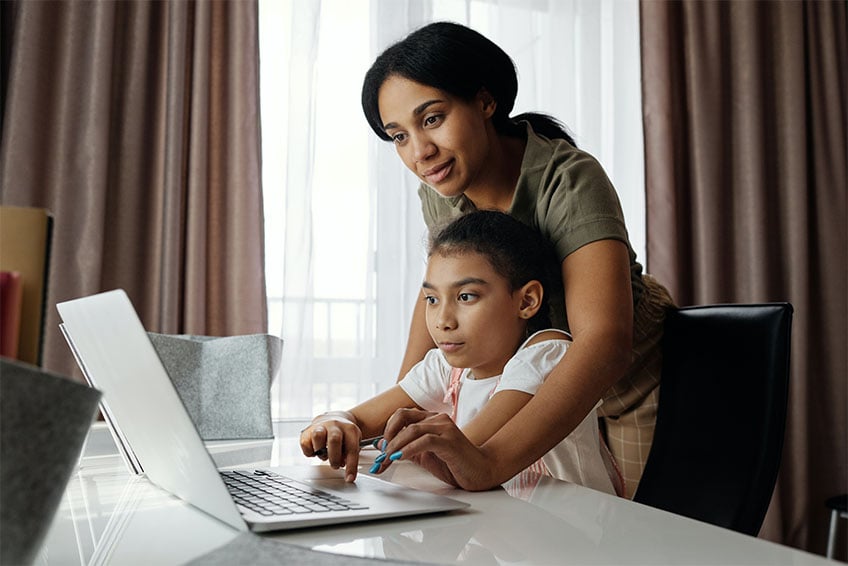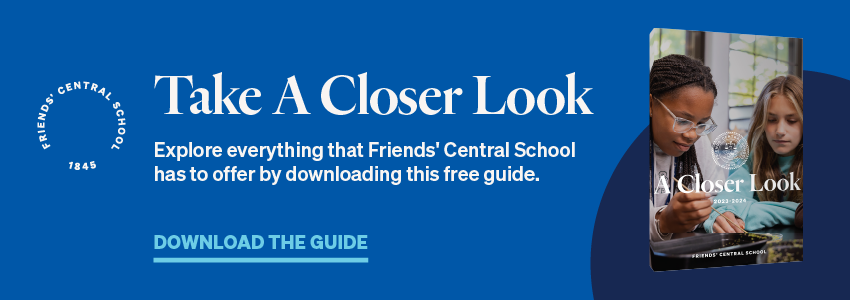
Even in normal times, parents often worry that their child might fall behind their peers by missing a day or week of school. And for good reason: It’s been demonstrated that children can lose up to one month’s worth of learning simply over the course of a regular summer break.
But these times are not normal. Now, in addition to summer learning loss, educators and families are concerned about the so-called “COVID-19 slide.” The coronavirus pandemic and the social distancing and distance learning initiatives that it has sparked have many parents wondering whether or not their children will be ready to return to school come fall.
Free Downloadable Guide: Take a Closer Look at Friends' Central School
As a parent to rising 5th and 9th graders, I myself often wonder: Are we ready? I know that many other families are feeling the same way.
The answer is: It depends. For some schools that struggled with the transition to distance learning, students may need added support in order to make up the difference and prepare for the upcoming school year.
At Friends’ Central, we understand the importance of the whole child. As teachers, educators, and parents, we evaluate our students at the beginning of the school year in order to build a curriculum that will help them thrive and grow in preparation for the year ahead. We also know that there are steps families can take to help make up for lost time in the classroom.
Below, we offer a number of strategies that you can use to keep your child learning and help alleviate the COVID-19 slide so that you can feel confident that they will be prepared to pick back up in the fall.
5 Ways to Make Up For Lost School Time
1. Focus on building relationships.
The first step towards helping your child make up for lost time in the classroom is determining whether or not a learning gap exists. While parents may notice when a child is overtly struggling with their schoolwork, other times the signs can be more subtle. Your child’s teachers and instructors, who spend hours with your child each and every day as they engage in learning opportunities is an excellent source of information and guidance in this regard.
That’s why it is so important for families to work to build strong, healthy, and respectful relationships—both between your child and their teachers, as well as between the teachers and yourself. Collaboration and communication between home and school doesn’t just benefit your child; it also helps to make your child’s school community more vibrant and fulfilling.
2. Keep a consistent schedule, even in the summer.
In the early days of distance learning, many families found that the schedules which allowed their households to operate effectively were suddenly completely rearranged. As it became clear that remote education was here to stay, though, most families realized that setting and maintaining a consistent schedule would be critical to their child’s academic and emotional success.
This same fact holds true over the summer months. While it’s okay to be somewhat lenient in the structure of your child’s day over summer break, finding a way to maintain a regular, consistent routine is one of the best things you can do for your child. First, it will make it easier for them to transition back into the school year and school schedule come fall—allowing them to get more value out of their education. Second, it allows you to build learning specifically into your child’s day, whether during the school year or during the summer months.
I specifically recommend that parents weave in different kinds of activities, including a mixture of academics and play. Your child doesn’t need to be in the classroom or behind a computer screen to be learning.
3. Find a balance between academics and play.
There’s no doubt that academics are important. But for children of all ages—and especially for young children—play is also a critical piece of the puzzle. Play helps build important fine motor skills, teaches creativity, and allows families to approach issues that can otherwise be somewhat challenging, such as concepts of equity and fairness.
So, while it’s important to focus on schoolwork, it’s also important to find time for play. While many games are educational, they also teach and reinforce important fair play guidelines. Taking turns, knowing what to say when one wins or loses, etc.—are extremely important skills to help build resilience.
4. Consider tutoring.
If you determine that your child could use some extra support to catch up on lost time in the classroom, either through discussions with your child’s teachers or through your own observations, tutoring can be a wonderful next step.
Tutoring offers one-to-one support which is tailored to your child’s specific needs. As a parent and teacher, I believe that it often is beneficial to have someone outside the family/home provide extra support. Children don’t want to feel like they’re “failing” in front of their parents, and will often take more risks and have more success when working with a teacher or tutor.
It can often be less stressful and lead to less arguing over school work, as well. In my own experience, I’ve found that it can contribute to a healthier, happier relationship for everyone involved.
5. Take advantage of summer enrichment opportunities.
If your school or district offers summer enrichment opportunities, those can also be an excellent means of keeping your child engaged and learning during the summer.
At Friends’ Central, for example, we provide a Summer Scholars program for students in our Middle and Upper School, which offers focused support in topics such as algebra, geometry, pre-calculus, calculus, reading, writing, and more. Even during the coronavirus pandemic, with all of the restrictions that come with social distancing, these programs are available virtually.
Additionally, many schools (including the Friends’ Central Lower School) offer summer work packets that act as a guide for families to prepare for the demands of the next year. These work packets, paired with online resources (both free and paid) are tremendously helpful in keeping children learning and growing.
Support Where You Need It
If you’re concerned about your child potentially falling behind due to time out of the classroom, the good news is this: There is support for your family. We encourage you to speak to your child’s teachers and instructors to see what resources are available to you. If you feel that your child isn’t receiving the support they need to succeed and thrive, it may be time to consider whether or not it is time to change schools.




